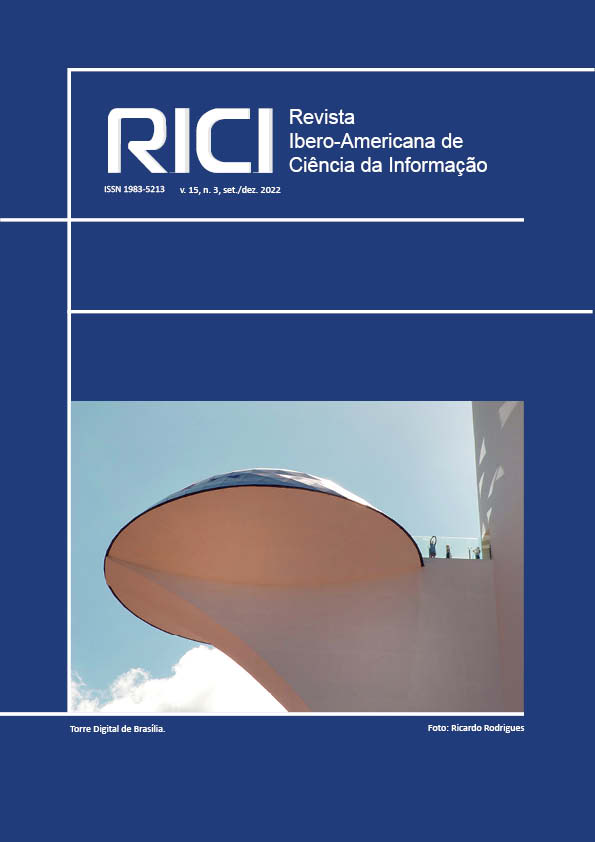Literature as informational resources and testimonial traces
DOI:
https://doi.org/10.26512/rici.v15.n3.2022.42995Keywords:
Literature, Archive, Documento, Informational resources, Testimonial traceAbstract
Starting from the premise that the literary text can be treated as a document, the present article aims to analyze under what conditions certain fictional and poetic works are able to mobilize and reveal, at the heart of their writing, a set of informational resources and testimonial traces. In view of this, this is a bibliographic, documentary and exploratory study that, supported by the concepts of trace and resource, investigates how literature can be constituted as an “archive” that organizes, preserves and perpetuates the historical memory of an era. The results demonstrated that literary writing is capable of managing in itself numerous informational resources and testimonial traces with the potential to offer readers a better delineated image, both about the life story of a writer and the cultural and political contingencies that guided the individual and collective actions, as well as the events of a certain socio-historical reality.
Downloads
References
AGAMBEN, Giorgio. O que resta de Auschwitz: o arquivo e a testemunha. São Paulo: Boitempo, 2008. (Estado de sítio).
ASSIS, Maria do Socorro Pereira de. Poema sujo de vidas: alarido de vozes. 2011. 275f. Tese (Doutorado em Letras – Teoria da literatura), Pontifícia Universidade Católica do Rio Grande do Sul, Porto Alegre, 2011.
ASSMANN, Aleida. Espaços da recordação: formas da memória cultural. Campinas: Editora da Unicamp, 2011.
BARTHES, Roland. Aula. 12 ed. São Paulo: Cultrix, 2004.
BOSI, Alfredo. Entre a literatura e a história. São Paulo: Editora 34, 2013.
CAMENIETZKI, Eleonora Ziller. Poesia e política: a trajetória de Ferreira Gullar. Rio de Janeiro: Editora Revan, 2006.
CAPURRO, Rafael. What is irformation for? A philosophical reflection. In.: VAKKARI, Perti; CRONIN, Blaise (Org.). Conceptions of library and Information Science: historical, empirical and theoretical perspectives. London: Taylor Graham, 1992.
COMPAGNON, Antoine. Literatura para quê?. Belo Horizonte: Editora UFMG, 2009.
COUTINHO, Afrânio. A literatura no Brasil. 3. ed. Niterói. José Olympio Editora. 1986.
DERRIDA, Jacques. Pensar em não ver: escritos sobre as artes do visível (1979-2004). Florianópolis: Ed. da UFSC, 2012.
DIDI-HUBERMAN, Georges. Imagens apesar de tudo. São Paulo: Editora 34, 2020. (Coleção TRANS).
ECO, Umberto. Obra aberta: forma e indeterminação nas poéticas contemporâneas. São Paulo: Editora Perspectiva, 1991.
FIGUEIREDO, Eurídice. A literatura como arquivo da ditadura. Rio de Janeiro: 7 letras, 2017.
FULY, Suzana Maria de Abreu Ruela. Leitura do Poema sujo de Ferreira Gullar. 2005. 106f. Dissertação (Mestrado em Letras – literatura Brasileira) – Faculdade de Letras, Universidade Federal de Minas Gerais, Belo Horizonte, 2005.
GINZBURG, Carlo. Mitos, emblemas, sinais: morfologia e história. São Paulo: Companhia das letras, 1989.
GINZBURG, Carlo. O fio e os rastros: verdadeiro, falso, fictício. São Paulo: Companhia das Letras, 2007.
GULLAR, Ferreira. Autobiografia poética e outros textos. Belo Horizonte: Autêntica Editora, 2015. (Humanitas)
JIMÉNEZ, Ariel. Ferreira Gullar conversa com Ariel Jiménez. São Paulo: Cosacnaify, 2013.
LARA, Marilda Lopes Ginez de; ORTEGA, Cristina Dotta. Para uma abordagem contemporânea do documento na Ciência da Informação. In.: CONGRESSO ISKO, 2011, Ferrol. Anais... La Coruña: Universidade da Coruña, 2012. p. 371-387. Disponível em: <https://ruc.udc.es/dspace/bitstream/handle/2183/11621/CC_132_art_23.pdf?sequence=1&isAllowed=y>. Acesso em: 22 mai. 2020.
LE GOFF, Jacques. História e memória. 3. ed. Campinas, SP: Editora da UNICAMP, 1990. E-book (Não paginado).
MARQUES, Reinaldo. Memória literária arquivada. Aletria, 2008, jul./dez., v. 18, p. 105-119.
MEYRIAT, Jean. Documento, documentação, documentologia. Perspectivas em Ciência da Informação, Belo Horizonte, v. 21, n.3, p. 240-253, jul./set. 2016.
MORAÑA, Mabel. Documentalismo y ficción: testimonio y narrativa testimonial hispano-americana en el siglo XX. In.: PIZZARO, Ana (Org.). Palavra, literatura e cultura. São Paulo: UNICAMP, 1995, v.3, p. 113-150.
PATRASSO, André Luís de Almeida; ALVES, Mariana da Hora; ZULLI, Andre Luis Cardoso Azoubel. Imagens em movimento: cinema, documento e história. In.: THIESEN, Icléia (Org.). Documentos sensíveis: informação, arquivo e verdade na ditadura de 1964. Rio de Janeiro: 7Letras, 2014, p. 289-312.
RICŒUR, Paul. A memória, a história, o esquecimento. Campinas, São Paulo: Editora da Unicamp, 2007.
RICŒUR, Paul. Tempo e narrativa. Tradução de Claudia Berliner. São Paulo: WMF Martins Fontes, 2010. v.3.
RICŒUR, Paul. Tempo e narrativa. Tradução de Constança Marcondes Cesar. Campinas; SP: Papirus, 1994. Tomo I.
RICŒUR, Paul. Tempo e narrativa. Tradução de Marina Appenzeller. Campinas; SP: Papirus, 1994. Tomo II.
SELIGMANN-SILVA, Márcio. Introdução. In.: SELIGMANN-SILVA, Márcio (Org.). História, memória, literatura: o testemunho na era das catástrofes. Campinas; SP: Editora Unicamp, 2003, p. 07-44.
SELIGMANN-SILVA, Márcio. Narrativas contra o silêncio: cinema e ditadura no Brasil. In.: SELIGMANN-SILVA, Márcio; GINZBURG, Jaime; HARDMAN, Francisco Foot (Orgs.). Escritas da violência: representações da violência na história e na cultura contemporâneas da América Latina. Rio de Janeiro: 7Letras, 2012. v.2, p. 64-85.
THIESEN, Icléia (Org.). Documentos sensíveis: informação, arquivo e verdade na ditadura de 1964. Rio de Janeiro: 7Letras, 2014.
Downloads
Published
How to Cite
Issue
Section
License
Copyright (c) 2022 Jonathan Kaefer Gomes da Costa, Fabrício José Nascimento da Silveira

This work is licensed under a Creative Commons Attribution 4.0 International License.
Copyright Notice
Authors who publish in this journal agree to the following terms:
- Authors retain copyright and grant the journal right of first publication with the work simultaneously licensed under the Creative Commons Attribution License 4.0, allowing the sharing of work and recognition of the work of authorship and initial publication in this journal.
- Authors are able to take on additional contracts separately, non-exclusive distribution of the version of the paper published in this journal (ex.: distribute to an institutional repository or publish as a book), with an acknowledgment of its initial publication in this journal.
- Authors are permitted and encouraged to distribute their work online (eg.: in institutional repositories or on their website) at any point before or during the editorial process, as it can lead to productive exchanges, as well as increase the impact and citation the published work.
















